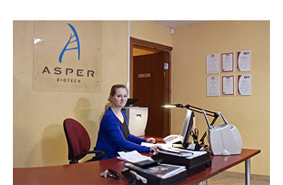Published 16/10/2017
Tangier Disease
Sequencing of the ABCA1 gene
Genes
(full coding
region): |
ABCA1 |
| Specimen requirements: |
2-4 ml of blood with anticoagulant EDTA
1 µg DNA in TE, AE or pure sterile water at 100-250 ng/µl
The A260/A280 ratio should be 1.8-2.0. DNA sample should be run on an agarose gel as a single band, showing no degradation, alongside with a quantitative DNA marker. |
Indications for genetic testing:
1. Confirmation of clinical diagnosis
2. Differential diagnosis
3. Genetic counceling
Tangier disease is characterised by hypocholesterolaemia, extremely low or absent level of HDL cholesterol, modestly decreased LDL cholesterol and elevated triglycerides in plasma.
The major clinical signs of Tangier disease include hyperplastic yellow-orange tonsils, hepatosplenomegaly, and peripheral neuropathy. Rarer complications may include corneal opacities that typically do not affect vision, premature atherosclerotic coronary artery disease, and mild hematologic manifestations, such as mild thrombocytopenia, reticulocytosis, stomatocytosis, or hemolytic anemia.
Tangier disease is inherited in an autosomal recessive manner. Tangier disease is caused by variants in the ABCA1 gene. Global prevalence of the disease is 1:640 000.
References:
Assmann G et al 2001. Familial analphalipoproteinemia: Tangier disease. In: Scriver CR, Beaudet AL, Sly WS, Valle D, Vogelstein B, eds. The Metabolic and Molecular Bases of Inherited Disease. 8 ed. Vol 2. New York, NY: McGraw-Hill; 2001:2937-80.
Burnett JR et al 2019. Tangier Disease. GeneReviews® [Internet]. November 21, 2019.
Hooper AJ et al 2017. Clinical utility gene card for: Tangier disease. European Journal of Human Genetics volume 25, pagese1–e3(2017).
Published 27/11/2013
Asper Biotech’s scientist Piret Põiklik gives a presentation at MiSeq Day in Helsinki on Monday 2nd December. The presentation will focus on implementation of Illumina TruSight Exome assay in a routine laboratory setting. The meeting held by Illumina Ltd is targeted on the multitude of different applications for the MiSeq.
Published 19/06/2013
Asper Biotech is offering whole exome sequencing at introductory price of 890 Euros providing average coverage of 50x per exome.
As the summer is approaching it is now a good time to collect samples for sequencing with excellent quality and low-cost. The call for sample shipment starts today and lasts till the 31st of August.
Technical details:
- Price 890 Euros per sample
- 50x coverage
- Annotated VCF file
- Target region size 37 Mb
- Number of target exons 201 121
- Final day for the shipment 31st of August
- TAT 13 weeks
Just place the samples in the envelope, include the filled form and send to
Asper Biotech
Vaksali 17a
Tartu 50410
Estonia
Ph: +372 7307 295
PS. Please note that although diagnostic package is also included to the form the stated price is for genotyping service only.
Published 11/03/2013
Next-generation sequencing (NGS) technologies have improved throughout the years as rapid, high-throughput and cost-effective approaches to fulfil medical sciences and research demands. Asper Biotech has now implemented Illumina MiSeq to it’s routine workflow and offers a variety of NGS services in it’s CLIA certified laboratory. The list of services can be found from Asper Biotech’s page here. Our highly experienced scientific team as well as medical doctors are here to deliver you the results for both scientific and medical diagnostic projects. Just contact info[at]asperbio.com for more information.
Published 16/04/2010
Asper Biogene is a genetic testing company focused on diagnostics of hereditary diseases. Multiple medical specialties are covered by our comprehensive testing selection extending from single gene analysis to whole genome sequencing.
In Asper Biogene we are constantly upgrading our testing menu and diagnostic possibilities to achieve the ultimate ambition that no disease goes undiagnosed.
Our laboratory is an authorized medical laboratory, ISO 15189:2012 and ISO 9001:2015 certified. We are participating in the European Molecular Genetics Quality Network (EMQN) quality assessment schemes in order to deliver genetic services at the highest level of quality standards.
Our clients, including leading university hospitals, private clinics, commercial laboratories and research organisations are from more than 40 countries. Development and elaboration of new tests are continuous processes in our daily practice to meet the customers’ needs and provide testing services to more patients and healthcare providers. We are also offering custom-test development with complete workflow and full customer support.
Besides providing genetic diagnostic services, we are an appreciated scientific partner for many international R&D projects due to our innovation-driven approach and long-lasting experience. We have had successful collaboration with different funding agencies supporting R&D activities, which have led to technological improvements and moreover to state-of-the-art genetic tests. Our expertise is widely recognized by participation in numerous European-wide research projects where we have been incorporated as an essential partner.


